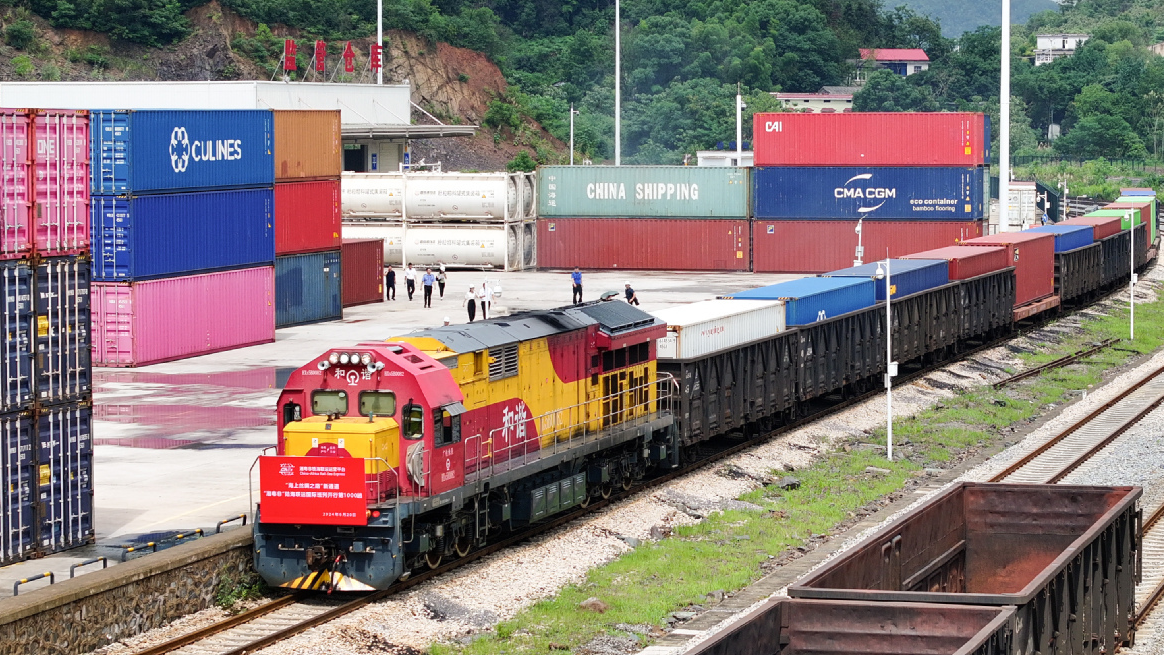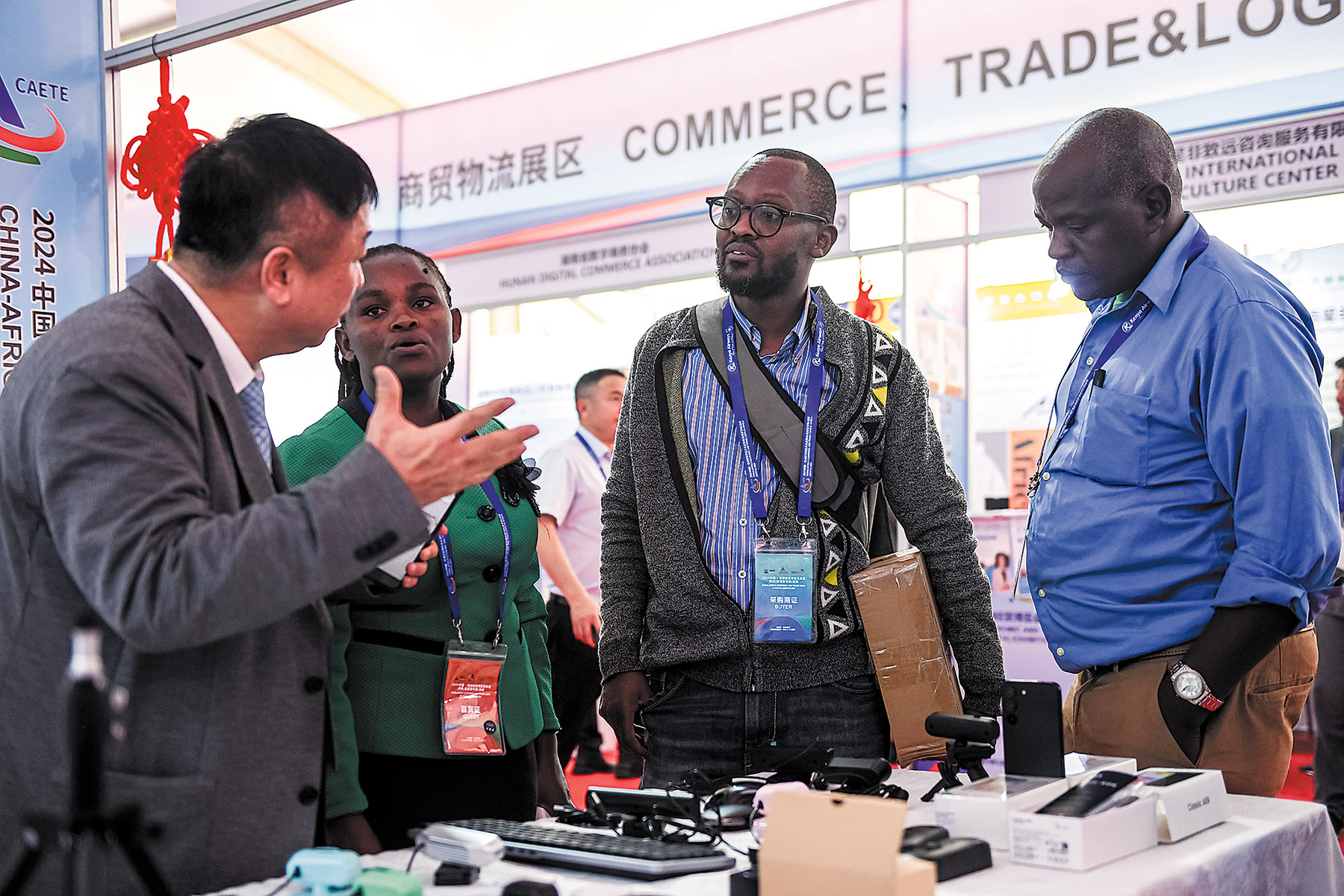Chinese companies play a vital role in helping boost continent’s manufacturing, trade, energy, other sectors

At a factory in Port Elizabeth, South Africa, workers in blue uniforms meticulously assemble vehicles, while another team maneuvers around 300 sport utility vehicles and sedans into a staging area.
These cars, manufactured at a facility of Chinese carmaker Beijing Automotive Group Co (BAIC), will be delivered to a customer, South African Airways, and to several dealerships in Pretoria within a week.
These cars testify to the inroads Chinese companies are making in the auto market across Africa, from Ghana to Ethiopia and from Morocco to South Africa, said Chang Rui, BAIC’s vice-president.
With light truck and shoe factories established in Ethiopia, a giant photovoltaic plant generating clean energy in Kenya, and manufacturing facilities producing electronic components, building materials, clothing fabrics, daily necessities and food processing goods in Egypt, Nigeria, Benin, Mozambique, Zambia and Tanzania, Chinese manufacturers are steadily building a solid reputation in Africa for products and services that are not only affordable, but also easily serviceable.
Chinese companies in Africa have traditionally made their mark through large-scale infrastructure and energy projects, said Yao Guimei, a researcher at the China-Africa Institute, which is part of the Beijing-based Chinese Academy of Social Sciences.
“However, as the region embarks on a new phase of development, they have shifted their approach by investing more in modern manufacturing and service-related businesses over the past decade,” said Yao, adding that these moves have effectively supported international production capacity cooperation and created new jobs in host countries.
For instance, the establishment of BAIC’s South Africa factory has not only boosted the development of the South African automotive industry and offered consumers more choices, but also involved over 150 local small and medium-sized enterprises in the process, according to information released by BAIC.
It has created more than 3,000 jobs across the upstream and downstream industry chains and trained a group of professionals and managers.
In Kigali, capital of Rwanda, NEIITC Co Ltd, a television manufacturer founded by Chinese businessman Liu Wenjun, is able to assemble over 2,000 units of 32-inch televisions daily. With a unit price of 600 yuan ($84), these televisions, once considered a luxury in Africa, are now being watched by a large number of families in Rwanda. The Chinese company today holds about 40 percent market share in this area in the East African country.

After launching the project with a total investment of over $1 million two years ago, Liu said the market of Rwanda previously was dominated by Indian merchants, who imported TVs from China and enjoyed gross profit margins of up to 50 percent.
However, the company quickly drove down the TV prices while still maintaining a gross profit margin of over 20 percent, after it established a local factory using materials and equipment from China.
“Initially, entering larger markets requires substantial cash flow, and since my capital was limited, starting in a smaller market was a safer approach,” said Liu.
One key characteristic of the African market is that it is “large but thin. Africa is vast, but the capacity of individual markets is limited. The challenge for Chinese entrepreneurs lies in identifying growth markets, a task that demands sharp insight”, said Wang Luo, director of the Institute of International Development Cooperation, which is part of the Chinese Academy of International Trade and Economic Cooperation in Beijing.
With more orders now in hand, NEIITC plans to use Rwanda as a hub to expand into neighboring countries. The company also intends to introduce other household appliances like refrigerators soon, further enriching the product lineup.
Besides household appliances, new cars command strong demand from African governments, businesses and residents. Chinese new energy vehicles as well as fossil fuel-powered cars, and solar power stations, have strong appeal in Africa, said Chen Bin, deputy director of the expert committee at the Beijing-based China Machinery Industry Federation.
For instance, Botswana Power Corp signed a power purchase agreement with Sinotswana Green Energy, a consortium of Chinese and Botswanan companies, in mid-August, to officially launch the southern African country’s first 100-MW photovoltaics power project.
The deal was structured into an engineering, procurement and construction contract, with operations and maintenance of the Jwaneng 100-MW solar station covered for 25 years, within the country’s plan that is expected to spur its renewable energy use to 50 percent by 2036.
Sinotswana Green Energy was jointly established by China Harbour Engineering Co, China International Water and Electric Corp and New Energy Company Proprietary Ltd, a local company. The project is expected to start power generation at the end of 2025.
Once completed, the project will significantly support Botswana’s electricity needs, ensuring the power supply required for its economic growth, said Bai Yinzhan, board chairman of the Beijing-headquartered China Harbour Engineering Co.

The project aligns with Botswana’s goals of providing affordable, reliable and sufficient energy supply for sustainable growth, while also enhancing access to efficient utilization of energy resources.
With many African countries entering a new era of green and innovation-led growth, China’s new energy vehicles, lithium batteries and photovoltaic product exports to Africa increased by 291 percent, 109 percent and 57 percent year-on-year, respectively, in 2023, data from China’s General Administration of Customs (GAC) showed.
Trade between China and Africa rose 5.5 percent year-on-year to 1.19 trillion yuan in the first seven months of this year, while China’s trade with Africa in intermediate goods posted 6.4 percent year-on-year growth, official data showed.
Lyu Daliang, director-general of the GAC’s Department of Statistics and Analysis, said trade in intermediate goods between China and Africa accounts for 68 percent of the total value of bilateral trade, helping Africa in its process of industrialization and economic diversification efforts.
“China-Africa trade has seen rapid growth, driven by win-win cooperation,” said Lyu.
Echoing that sentiment, Zhang Chun, a researcher at the Center for African Studies, which is part of Yunnan University in Kunming, Southwest China’s Yunnan province, said the growing foreign trade not only highlights the remarkable achievements of China’s high-quality economic development, it also plays a crucial role in advancing Africa’s social development and enhancing the living standards of local communities.
“China and Africa’s economies are highly complementary,” Zhang said, emphasizing that China offers mature, practical technologies, advanced equipment and ample capital, while African countries hold significant advantages in market size, manpower and natural resources.
By the end of 2023, China’s nonfinancial direct investment stock in Africa exceeded $40 billion, making it one of the largest sources of foreign investment in the continent. Over the past three years, Chinese companies have created more than 1.1 million jobs locally in Africa, according to the Ministry of Commerce.
The economic and trade cooperation zones in Africa that Chinese firms have invested in cover sectors such as agriculture, manufacturing and logistics, attracting over 1,000 companies. These zones have made significant contributions to local tax revenue, export growth and foreign exchange earnings.
In addition to boosting businesses related to manufacturing and trade in services in Africa, China is keen to encourage and support financial institutions from both its market and Africa to strengthen exchanges and innovate financial cooperation models in the years ahead.
Shen Xiang, director-general of the Department of Western Asian and African Affairs at the Ministry of Commerce, said the Chinese government will focus on diversifying financial products and supporting cooperation between China and Africa in areas like green development, the digital economy and the growth of small and medium-sized enterprises in the next step.
Dismissing certain countries’ “debt trap” narrative in Africa, Shen said that based on a study recently released by the International Monetary Fund, commercial bonds and multilateral debt accounted for 66 percent of Africa’s total external debt in 2023, while China-Africa bilateral debt made up only 11 percent.
This means that China has never been the main creditor of Africa’s debt. Some parties have used the issue of African debt to make baseless accusations. Their objective is merely to tarnish and disrupt China-Africa cooperation, he said.


